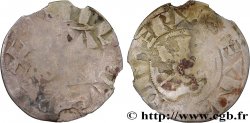Лицевая сторона
Аверс: легенда: + PHIL (LIS) IP’ RE, (LÉGENDE COMMENÇANT À 9 HEURES).
Аверс: описание: Dans le champ, FRA/OCN en deux lignes en boustrophédon.
Аверс: перевод: (Philippe, roi des Francs).
Обратная сторона
Реверс: легенда: + ARRAS CIVITAS.
Реверс: Описание: Croix cantonnée aux 2 et 3 d’un lis.
Реверс: перевод: (Cité d’Arras).
Историческая справка
PHILIP II "AUGUSTUS"
(09/11/1180-07/14/1223)
Son of Louis VII and Adele of Champagne, Philippe II was born in 1165. Crowned in 1179, sole king in 1180, he quickly freed himself from the tutelage imposed on him by his uncles: Guillaume aux Blanches Mains, Archbishop of Reims, Henri le Libéral, Count of Champagne, Thibaud V, Count of Blois and Chartres, Seneschal of France, and Étienne, Count of Sancerre. To do this, he married, in 1180, Isabelle de Hainaut, daughter of the powerful count of Flanders, Philippe d'Alsace, who would soon turn against him.. The first five years of the reign passed in an indecisive struggle against several of his great vassals.. The people of Champagne submitted first. In 1185, by the Treaty of Boves, the king won over Philippe of Alsace the expectation of Artois, part of Vermandois and the city of Amiens. In 1186, he invaded Burgundy. In 1187, he attacked the Angevin domain and linked up with Richard the Lionheart, rebellious son of Henry II Plantagenet. The old king died in 1189, abandoned by all. From now on it is Richard, his successor, who would stand up to the King of France. In 1190, the two sovereigns who were still allies left together for the crusade. Embarked one in Genoa, the other in Marseilles, they joined in Sicily, where they lingered six months, and passed from there in front of Saint-Jean-d'Acre that the Christians had besieged for two years.. Acre surrendered on July 13, 1191. Soon Philippe returned to France, leaving Richard in the Orient.. Some time later, the latter, on his way back, fell into the hands of the Duke of Austria and the Emperor Henry VI, a captivity which lasted until 1194, for the greater benefit of the King of France and the prisoner's brother, John Lackland. As soon as the King of England was freed, a fierce war broke out between Richard and Philip, during which the mercenary leaders of both sides engaged in pillage and massacre.. The fate of arms was unfavorable to the French, but the death of Richard, before Châlus, in 1199, delivered Philip from this formidable enemy.. Jean sans Terre, his brother and successor, did not have his talents as a man of war and made himself unpopular with his barons.. Within a few years, the King of France would strip him of much of his inheritance.. In 1202, the King of England was declared a felon and condemned to be deprived of his lands. Normandy was conquered in 1204, Poitou in 1204-1205, Brittany in 1206. In 1210, Philip even planned to land in England. Soon, the domain of the King of England on the continent was reduced to Aquitaine. In 1213, a coalition was formed against the King of France, comprising Renaud, Count of Boulogne, Ferrand, Count of Flanders, Jean sans-Terre, and Emperor Otto IV of Brunswick. Philippe would be caught between an English landing in Poitou and a German-Flemish invasion in the East. However, on July 2, 1214, Prince Louis defeated the English at La Roche-au-Moines. On July 27, in Bouvines, Philippe crushed the German-Flemish coalition. The Plantagenets were definitely defeated and King John of England would soon have to sign the Magna Carta (1215). The King of France was able to enjoy peace until the end of his reign. The increase in the royal domain under Philip II was unprecedented; all the great fiefdoms of Northern France still independent (Burgundy, Champagne), had to bend to his will. In the South, the Albigensian Crusade opened Languedoc to the King of France. From there comes the nickname Augustus, given to him by his historian, Rigord, monk of Saint-Denis. The progress of trade, the franchises granted to the bourgeois, the rise of the communes, the organization of the royal court, the institution of the bailiffs: all the novelties of the time bear the mark of this first great reign in Capetian history.. In 1193, Philippe Auguste had remarried with Ingeburge of Denmark. He divorced almost immediately, for reasons that have remained mysterious.. Rome declared this divorce null and void as well as the new union of the king with Agnès de Méran. In 1198, Pope Innocent III imposed a ban on the kingdom of France and, two years later, Philip pretended to take back Ingeburge, the better to keep her imprisoned.. It was not until 1213 that the reconciliation, at least formal, took place definitively.. From his marriage to Isabelle de Hainaut, Philippe had a son, Louis, born in 1187, who fought under the orders of his father and reigned after him..








 Cообщить об ошибке
Cообщить об ошибке Распечатать страницу
Распечатать страницу Отправить мой выбор
Отправить мой выбор Задать вопрос
Задать вопрос Consign / sell
Consign / sell
 Информация
Информация




